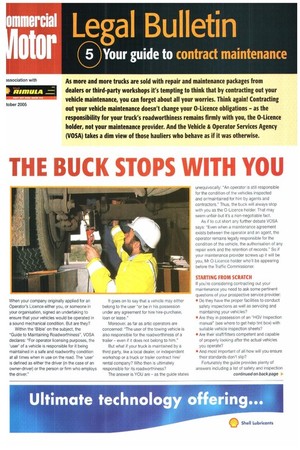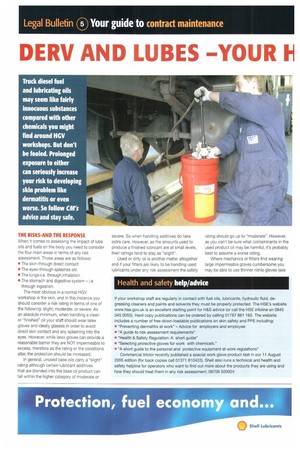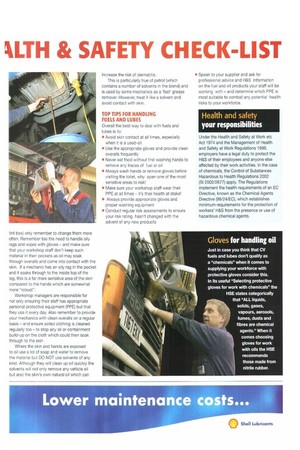THE BUCK STOPS WITH YOU
Page 67

Page 68

Page 69

If you've noticed an error in this article please click here to report it so we can fix it.
When your company originally applied for an Operator's Licence either you, or someone in your organisation, signed an undertaking to ensure that your vehicles would be operated in a sound mechanical condition. But are they?
Within the 'Bible' on the subject, the "Guide to Maintaining Roadworthiness", VOSA declares: "For operator licensing purposes, the 'user of a vehicle is responsible for it being maintained in a safe and roadworthy condition at all times when in use on the road. The 'user' is defined as either the driver (in the case of an owner-driver) or the person or firm who employs the driver." It goes on to say that a vehicle may either belong to the user "or be in his possession under any agreement for hire hire-purchase, loan or lease."
Moreover, as far as artic operators are concerned: "The user of the towing vehicle is also responsible for the roadworthiness of a trailer even if it does not belong to him."
But what if your truck is maintained by a third party, like a local dealer, or independent workshop or a truck or trailer contract hire/ rental company? Who then is ultimately responsible for its roadworthiness?
The answer is YOU are as the guide states unequivocally: "An operator is still responsible for the condition of the vehicles inspected and or/maintained for him by agents and contractors." Thus, the buck will always stop with you as the 0-Licence holder. That may seem unfair-but it's a non-negotiable fact.
As if to cut short any further debate VOSA says: "Even when a maintenance agreement exists between the operator and an agent, the operator remains legally responsible for the condition of the vehicle, the authorisation of any repair work and the retention of records." So if your maintenance provider screws up it will be you, Mr 0-Licence holder who'll be appearing before the Traffic Commissioner.
STARTING FROM SCRATCH If you're considering contracting out your maintenance you need to ask some pertinent questions of your prospective service provider: • Do they have the proper facilities to conduct safety inspections as well as servicing and maintaining your vehicles?
• Are they in possession of an "HGV Inspection manual" (see where to get help tint box) with suitable vehicle inspection sheets?
• Are their staff/fitters competent and capable of properly looking after the actual vehicles you operate?
• And most important of all how will you ensure their standards don't slip?
Fortunately the guide provides plenty of answers including a list of safety and inspection continued on back page
THE RISKS-AND THE RESPONSE
When it comes to assessing the impact of lube oils and fuels on the body you need to consider the four main areas in terms of any risk assessment. Those areas are as follows: • The skin-through direct contact • The eyes-through splashes etc • The lungs-i.e. through inhalation • The stomach and digestive system i.e through ingestion.
The most obvious in a normal HGV workshop is the skin, and in this instance you should consider a risk rating in terms of one of the following: slight; moderate; or severe. As an absolute minimum, when handling a clean or "finished" oil your staff should wear latex gloves and ideally glasses in order to avoid direct skin contact and any splashing into the eyes. However, while latex gloves can provide a reasonable barrier they are NOT impermeable to excess, therefore as the rating or the conditions alter, the protection should be increased.
In general, unused base oils carry a "slight" rating although certain lubricant additives that are blended into the base oil product can fall within the higher category of moderate or severe. So when handling additives do take extra care. However, as the amounts used to produce a finished lubricant are at small levels, their ratings tend to stay as "slight".
Used or dirty oil is another matter altogether and if your fitters are likely to be handling used lubricants under any risk assessment the safety rating should go up to "moderate". However, as you can't be sure what contaminants in the used product oil may be harmful, it's probably best to assume a worse rating.
Where mechanics or fitters find wearing large impermeable gloves cumbersome you may be able to use thinner nitrile gloves (see tint box) only remember to change them more often. Remember too the need to handle oily rags and wipes with gloves and make sure that your workshop staff don't keep such material in their pockets as oil may soak through overalls and come into contact with the skin. If a mechanic has an oily rag in the pocket and it soaks through to the inside top of the leg, this is a far more sensitive area of the skin compared to the hands which are somewhat more "robust".
Workshop managers are responsible for not only ensuring their staff has appropriate personal protective equipment (PPE) but that they use it every day. Also remember to provide your mechanics with clean overalls on a regular basis and ensure soiled clothing is cleaned regularly too to stop any oil or containment build-up on the cloth which could then soak through to the skin Where the skin and hands are exposed to oil use a lot of soap and water to remove the material but DO NOT use solvents of any kind. Although they will clean up oil quickly the solvents will not only remove any vehicle oil but also the skin's own natural oil which can increase the risk of dermatitis.
This is particularly true of petrol (which contains a number of solvents in the blend) and is used by some mechanics as a 'fast' grease remover. However, treat it like a solvent and avoid contact with skin,
TOP TIPS FOR HANDLING FUELS AND LURES
Overall the best way to deal with fuels and lubes is to: • Avoid skin contact at all times, especially when it is a used-oil • Use the appropriate gloves and provide clean overalls frequently • Never eat food without first washing hands to remove any traces of fuel or oil • Always wash hands or remove gloves before visiting the toilet, why open one of the most sensitive areas to risk!
• Make sure your workshop staff wear their PPE at all times it's their health at stake!
• Always provide appropriate gloves and proper washing equipment • Conduct regular risk assessments to ensure your risk rating hasn't changed with the advent of any new products • Speak to your supplier and ask for professional advice and H&S information on the fuel and oil products your staff will be working with and determine which PPE is most suitable to combat any potential health risks to your workforce.










































































































































































































